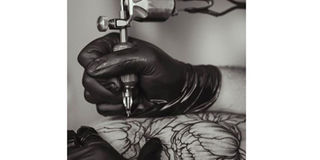Tattoos: Are they worth the trouble?

Some tattoos leave thick scars on the skin, Some even develop into keloids.So before tattooing, one should know how reactive their skin is. And the best way to do this is by visting a dermatologist for tests and advice before you get a tattoo. NET PHOTO
Edward Ogwang, dermatologist at the Skin Specialist Clinic Wandegeya says tattooing using unsterilised tools can develop into skin infections.
He says that one is prone to bacterial infections of the skin such as impetigo, swellings of the skin that are normally itchy, and cellutis, a skin swelling that that is normally painful and particularly warm when you touch it, and can relate or birth from unsterilized instruments.
“Furthermore, there can also be secondary risks in relation to blood; these are blood borne infections which include hepatitis B, C and HIV infections still from using the unsterilised instruments,” Ogwang adds.
Jamal, a tattoo artist in Kampala says to prevent risk of infection, he only uses a tattoo ink he trusts. This tattoo, he says is called intense and is made out of leaves and flowers, and is therefore good for the skin.
Allergic reactions
Dr Ogwang says that different skins have different reactions to certain dyes especially the coloured ones; red, green, yellow that are used to create contrast between the skin and the tattoo.
Skin cancer
Contrary to some myths, tattoos do not cause skin cancer although they can hide early symptoms of skin cancer.
“Skin cancer can start with a mole or a sore or a change in colour like a dark pigment and if it develops under a tattoo, you may not recognise it and by the time you do, it is probably spread to other areas.” Ogwang says
Keloids/hypertrophic scars
According to Ogwang, some tattoos leave thick scars on the skin. Some even leave behind keloids.
Successful treatment of these scars is rare. So before tattooing, one should first know what how reactive their skin is. And the best way to do this is by visting a dermatologist for tests and advice before you get a tattoo.
Tattoos and blood donation
Silas Mutorine an admirer of tattoos says despite his fascination with tattoos, he has not yet got one.
“My mother always says that someone with a tattoo cannot donate blood. I would want to donate blood so to be on a safe side, I have not gotten a tattoo,” he explains.
However, according to Ogwang, you can have tattoos and donate blood too.
“Tattooing is much safer now than it was in the past. In the past, tattoo needles were not sterilised leaving clients vulnerable to blood borne diseases. So people with tattoos were sidelined when it came to donating blood,” he says. If after reading all the risks named above you still insist on having that tattoo, at least, and take precautions.
Regulated studios;
Getting your tattoo in a health certified studio can help reduce risks of acquiring both skin and airborne infections.
Know your tattoo artist
According to Wako, before choosing a tattoo artist, make sure to see their work first and then decide if they are good enough.
Know the risks involved
As is with any serious venture, Ogwang says that before acquiring a tattoo, one should know the risks involved, side effects that might arise.
Peer pressure
Do not do it because others are or because you feel left out.
“I have seen some young people get tattoos and then later on regret the decision.” Ogwang says.
Don’t be in a rush
Rushing to a less trusted, experienced artist might cost you more than just money. Undoing tattoos is not as easy as it may sound.
SKIN DISEASE
If you carry the gene for psoriasis, dermatologists warn, a tattoo might activate the disease for the first time, or cause a flare if you already have it.
Other skin diseases can appear too: eczema (inflamed, itchy, irritated skin); vitiligo (a loss of skin pigment in blotches); sarcoidosis (an inflammatory disease); lichen planus (flat, itchy, purple bumps); even skin cancer.
If you are prone to scarring or have ever had a keloid, which is a scar that grew bigger than the wound, the American Academy of Dermatology suggests you should “rethink getting a tattoo.(www. edition.cnn.com)




